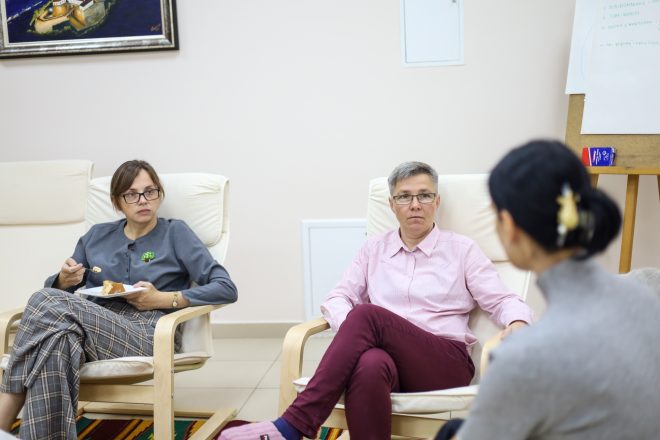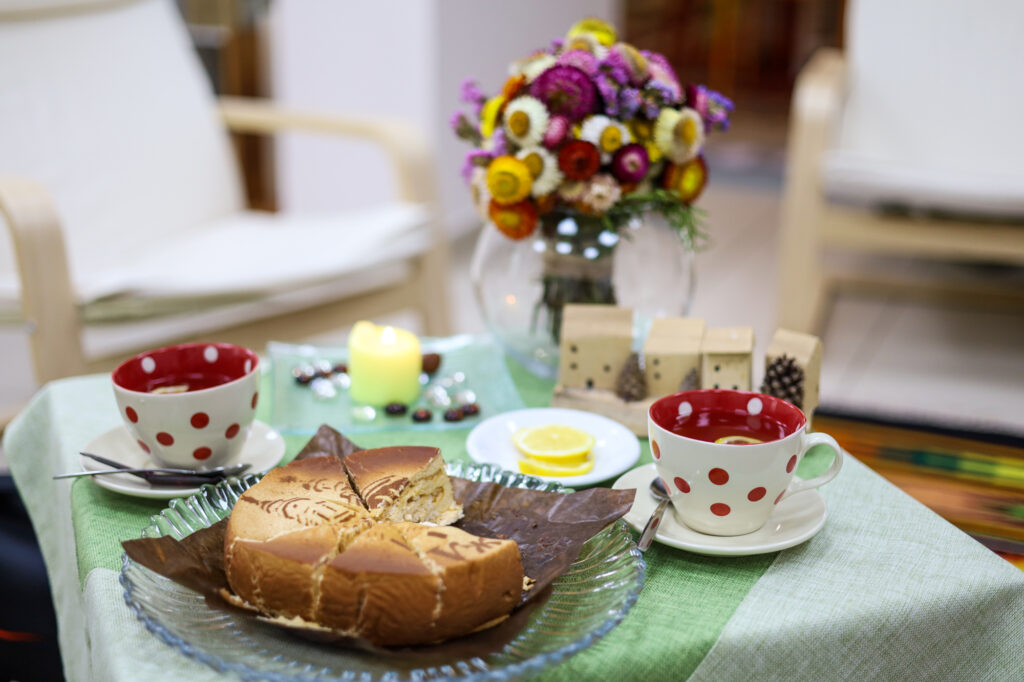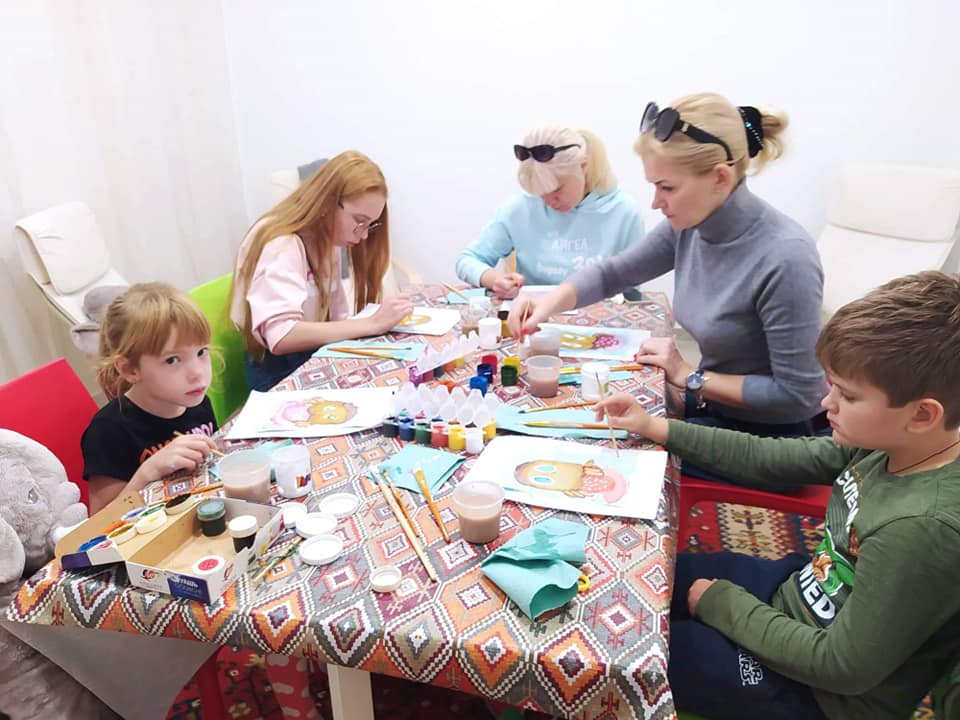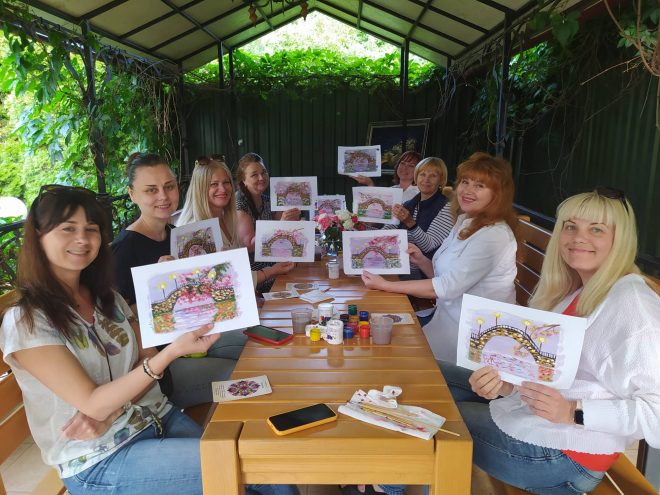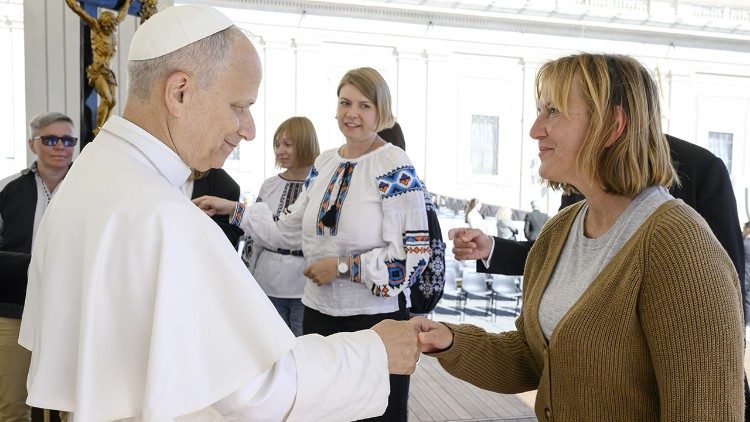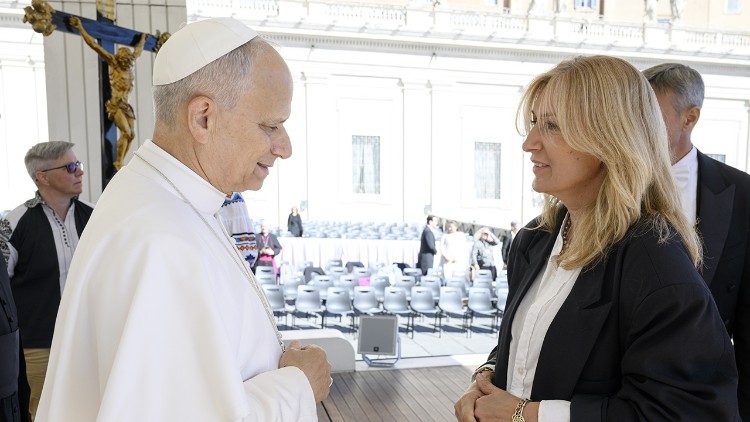Save those who help others from burnout

Meeting with the bandura in the space of the “Tree of My Life” Charitable Foundation
12.10.2022
Music therapy
17.10.2022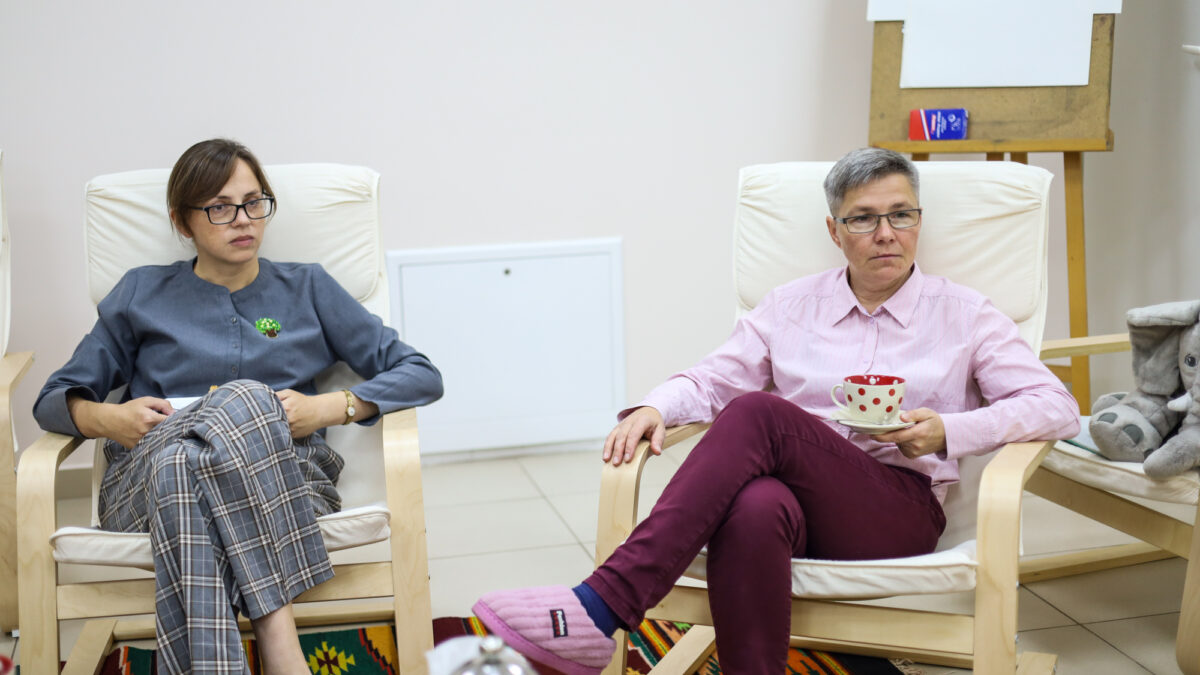
In Uzhhorod, the “Tree of My Life” space provides psychological assistance to volunteers and beyond.
Since the beginning of the full-scale war, Liubov Mykhailiuk and Ksenia Tarnavska have felt the need to be useful to the country. However, they focused their attention not on those who were directly affected, but on those who were helping. They saw how Transcarpathians rushed to volunteer. Non-stop, without sleep or respite, they took in, housed, fed, and consoled everyone who fled the bombing. With their experience in psychological counseling, the specialists realized that the volunteers themselves would soon run out of strength and fatigue would lead to burnout. Liubov Mykhailiuk had already gone through all this in Kyiv during the Maidan and the beginning of Russian aggression in 2014. At that time, Ukrainians were also rescuing internally displaced persons from Donbas, but in a few months, the internal resource was exhausted and devastation set in.
Therefore, on March 1, 2022, Liubov, together with Ksenia Teresa, founded a project that later grew into the Tree of My Life charity foundation, whose main task was to provide psychological assistance to volunteers. And they were right – such support was necessary, and group counseling was effective.
Today, the project team of 15 specialists continues to help volunteers, provides free psychological support to military families, the elderly, working children, internally displaced persons, and morally exhausted citizens who are looking for solace in communication. Work in groups in other areas is done for a symbolic fee. We asked them how it all started and how it works now.
We meet the co-founders of the Tree of My Life project on a rainy Saturday afternoon in the fall. In contrast to the wet, gloomy weather outside, the rooms of the foundation are quiet and cozy. This space maximizes calmness. Guests are invited to put on their slippers, tea is brewing on the table, and the hostesses are cutting the Uzhhorod cake. Dymko, the ash-colored cat, who is also affectionately called “our cat therapist,” lazily wags his tail as he perches on the wardrobe.
We have one hour to talk – after that, counseling will begin. The fact that psychological group meetings are held here is indicated by the chairs arranged in a circle. But in addition to dialogues and group conversations with psychologists, the clients of the psychological resource, educational and cultural space have various activities: they are engaged in art therapy, dancing and even beading. The space also hosts a psychological film club and master classes by famous cultural figures from Zakarpattia and Ukraine.
The live broadcast continues below.
* * *
Liubov Mykhailiuk is the head of the Tree of My Life Charitable Foundation and co-founder of the Tree of My Life psychological resource support project.
Her first profession was a journalist, later she received a master’s degree in religious studies in catechism and theology, and is currently pursuing a professional psychological education in resource-based counseling.
Originally from Galicia, she has been living in Uzhgorod for 2 years.
Ksenia Teresa Tarnavska is a co-founder of the organisation, an analytically oriented psychologist, a candidate for psychotherapist in the symbolic drama method, an active member of IRCGP, and the author of training programs.
VOLUNTEERS ARE REAL PEOPLE
Liubov: The Tree of My Life Charitable Foundation was a response to the challenge of the times. Since the beginning of the war, we all wanted to help, to be needed, and we did our best to help internally displaced citizens, to support the Armed Forces and territorial defense. Assessing the situation, analyzing what was happening and how it was happening, I realized from my own bitter experience that if volunteers and active local people burn out, everyone will be in trouble.
When volunteers do not notice and do not provide themselves with vital needs such as food, rest and sleep, forget about their families, work incessantly on a wave of adrenaline caused by stress, over time, a person becomes exhausted and burns out, which results in psychosomatic manifestations, exacerbation of chronic diseases, and the emergence of new ones, which ultimately leads to a hospital bed.
In 2014-2015, I was a volunteer myself and I know from the inside how things work. I also experienced professional and volunteer burnout. Faith, communication with a spiritual advisor, support from parents and friends helped, and eventually it made me want to get a second higher education.
I came to Transcarpathia at the invitation of Ksenia Teresa, with whom I worked together in one of the social humanitarian projects of a family home for young people. I worked there for a year and a half, and then the war came…
February 24, Thursday morning. Dymko woke me up at 4:20 a.m. and demanded to go outside. When I came back from a walk and read the news, my first decision was to go to the military registration and enlistment office. I can shoot well, I had military training at school, but I was not accepted – they said there was no position available.
I am a person who does not sit around and needs to do something. My grandparents defended the independence of Ukraine, it’s in my blood, so I decided to combine all my 3 professions into one and try to create something useful for people. We met with Ksenia Tereza, discussed it, came to the decision that very soon there will be a need for psychological assistance for volunteers and decided that we need to use our knowledge, resources, and experience effectively.
Ksenia Teresa: Before the war, I practiced individual counseling, group psychotherapy, and worked at the Maria Ward Social Center for students from low-income families and orphans. On February 24, everything changed. We discussed with Lyubov the possibilities of how and what to do to help, and immediately decided to direct our work to volunteers. We contacted our colleagues from Uzhgorod, Mukachevo and Svaliava, and they also supported us and agreed to do this work. Liubov started to deal with organizational issues, and I started to develop the program. It was a new situation for us, no one had prepared for the war, and we all found ourselves in a new reality.
Liubov: Since the beginning of the war, most of my psychology colleagues have focused on the crisis area. This is an urgent help to people who are in a state of shock. Kseniia Teresa and I realized that we needed to respond to the challenges, but at the same time, we needed to think about the future. That’s why the vision of our project was focused on the future. And the work here, unfortunately, is for decades. I thank my friends for supporting the project from the first days of the war.
FIRST WEEKS
Liubov: At the beginning it was quite difficult, we were looking for a place to hold psychological and resource support groups. We turned to Father Bishop Mykola Luchko and Father Bishop Neil Lushchak for help. With their permission, the team worked for the first 1.5 months in the premises belonging to the parishes of the RCC and IYCE in three cities: Uzhgorod, Mukachevo, and Svalyava.
Through announcements, posts on social media, and personal contacts, people slowly learned about us, volunteers began to come, and internally displaced people also began to seek psychological support.
Ksenia Teresa: Our task was to balance what was happening. Volunteers, like all ordinary people in a state of stress and physical exhaustion, were losing their bearings due to the disruption of their life balance. We analyzed what their life spheres look like now. For example, in the family, at work. Together, we came to an understanding of what they needed to do to find themselves and stabilize.
KEEPING THE BALANCE
Ksenia Teresa: Balance between all areas of life is a very important thing. Burnout begins when there is an imbalance. This can happen at any time, even when you are inspired by something, you get completely immersed in it and don’t notice how other areas start to suffer. We’re talking about contacts (relationships), physical (rest, sleep, self-care, hygiene, sports), activities (work, study), and spiritual inner world (religion, philosophy of life). If any of these areas is neglected, the body sends SOS signals. I give the example of a round wheel: imagine that some part of it is cut off – the uniformity will be disturbed. The wheel simply won’t roll and will slow down.
Another important phenomenon that clearly comes to the surface when you burn out is anger at the world around you, at everything that surrounds you.
Liubov: Another effective example we gave our group participants was a car and fuel. Or a phone and a source of charge. Without them, no devices work. Similarly, a person must understand that he or she must rest, eat, and devote time to himself or herself and his or her development. If the body is constantly doing one thing without a break, without rest, it will simply become exhausted.
WE ARE FOR YOU
Love: It is important for each of us to know that what we do is not in vain. If no one thanks you for your work, you wonder if anyone needs this work. Such rejection affects the person, his or her family, then the close environment, and so on. This is how the slogan we use in our work was born: “WE ARE FOR YOU”.
Ksenia Teresa: As of today, together with our colleagues in Uzhhorod, Mukachevo and Svaliava, we have provided counseling psychological assistance to more than 170 people of different status and age categories. In each city, our priority remains volunteers and citizens, in particular, families of military personnel (children, spouses, parents, sisters/brothers). The main task is to provide support to as many people as possible.
Very often people just need to release their emotions. That is why in our work we use various areas of psychological assistance and offer our participants different types of classes. For example, there are group body-oriented activities. They relax muscles through exercise and release emotions. These are dancing, exercise on mats. There are communication groups, behavioral groups, self-regulation classes, etc. Participants come once a week, and the group work lasts an hour and a half. The number of such meetings can be from 5 to 15, depending on the dynamics of the group. Colleagues also provide individual counseling when a participant expresses a desire to work alone with a psychologist.
We conduct various kinds of art therapy sessions. For example, during right-hemispheric drawing, internal calming processes occur, and the head “turns off”. Each meeting in each group has a very effective result.
A displaced person from Kyiv, a member of the first psychological support group for internally displaced citizens, and now our colleague, a psychologist-analyst by profession, leads a group on neurography. This is a method that helps to work out neural connections. The participant fulfills the presenter’s tasks – draws according to a certain algorithm. During the session, blocks are removed, and a support, an internal resource, is found.
Children’s groups include art therapy, fairy tale therapy, music therapy, and play therapy. We work with parents in parallel – the result of such work is very powerful. Most importantly, the interaction between parents and children continues outside our space.
We called the older age group “Time for Yourself – a respectable community of 60+”. For them, we organize excursions, educational events, psychological film clubs, thematic meetings, and invite writers and specialists in various fields. For example, we recently held a meeting on financial literacy.
We are currently discussing cooperation with the Mariupol Theater. We have a lot of interesting ideas. We are open to everyone, especially now for the families of servicemen and for the servicemen themselves, who are on rotation or commissioned. We cover different age groups, approach them from different angles, and work in a comprehensive manner. We have a lot of good feedback and it inspires us to “BE for YOU”.
Liubov: Each person is individual. There are participants who have been with us for 8 months. There are those who are just now beginning to need psychological support and communication. There are those who have received help and are in a stable condition. There is one more category – internally displaced citizens who have returned home and continue to contact us online.
Ksenia Teresa: I call our space a “concentrate” because people don’t have to run around looking for different kinds of help. Here, everyone can find something for themselves for free or for a nominal fee, set aside an hour and a half a week to take a break from the minute-by-minute news from the front or other moments that destabilize their psycho-emotional state, get resource support, etc. It is very important to take care of yourself and your resources. Know that if you have a hard time, feel depressed and burned out – WE ARE FOR YOU!
Love: We would like to thank all the benefactors who made this project possible and active, thank you to everyone who has supported us from the first day to the present, thank you for appreciating our work, for understanding its importance, especially in the present. We are grateful to the Roman Catholic Diocese of Mukachevo for its partnership, in particular to Bishop Mykola Luchko for his support and guidance of the entire team.
You can learn more about the “Tree of My Life” and register for the group on the center’s website:
Facebook: Tree of My Life | Facebook
Instagram: The Tree of My Life (@the.tree.of.my.life)
Phone: +380503317354
Larysa Lipkan, Varosh
Photo by Karina Asad and from the Facebook page “The Tree of My Life”
